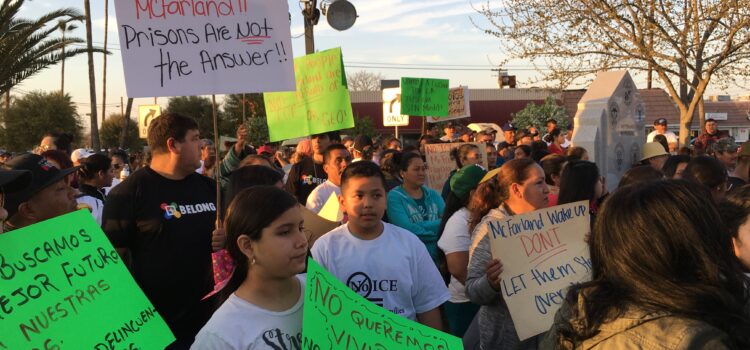
There is a small farm working community in Kern County where essential workers risk their lives everyday by going to work amid the COVID-19 pandemic to provide the nation with the food we eat.
This is the City of McFarland, where 40 percent of the city’s residents are foreign born and the median household income was $33,281 as of 2018.
Instead of focusing on their health during this pandemic, McFarland residents are disputing with the local governing body over whether it will allow GEO, Inc., a for-profit prison company, to turn two state prisons into immigration detention facilities.
We are living through a historical time. Local governments must make every effort to implement plans to ensure that our most vulnerable residents have access to shelter, healthcare services, food, and protections at work before to avoid the spread of COVID-19 to our essential workers.
This is not the time to double up on systemic oppression– our vulnerable communities should not be seen as disposable, and this idea of incarcerating people for profit must come to an end.
The history of racism in our nation has increased the vulnerability of our black, brown, immigrant, LGBTQ, and poor communities. We see this play out when local governments fail to protect their vulnerable residents and instead increase their vulnerability by investing in a culture of incarceration. When undocumented residents are afraid to leave their homes for fear of being deported, this leads increased stressed levels, trauma and poor health outcomes.
This is exactly what is happening in the City of McFarland, a community located in the southern part of California’s fruit basket.
It’s clear this is an important issue to the community. In February, hundreds of residents came out to protest at a McFarland Planning Commission hearing in opposition of GEO Group’s proposal to convert two state prisons into immigrant detention centers that would hold an additional 1,400 undocumented immigrants. That night, the motion failed with a deadlocked vote of 2-2. The next day, McFarland’s mayor resigned from his position after nine years in office.
The victory was short-lived as GEO Group appealed the proposal to the McFarland City Council and requested that the council should hold the hearing when all five city council members are present.
Here’s a run down of how the city made this meeting rather inaccessible to its constituents.
The meeting lacked interpretation services. How is a community where 84.7 percent of its residents speak a language other than English in their homes supposed to follow along during this crucial meeting? This meeting was immediately inaccessible to the majority of the residents the second the city decided to go without interpretation services.
Resident participation was also limited as comments had to be emailed before the start of the meeting. The comments that came written in English, were only read in English and the comments that came in Spanish were only read in Spanish.
This shows a lack of any intentional community engagement in the selection process, and many community members whose lives are at stake found this disheartening.
The Brown Act has been modified during this pandemic and allows for local governments to hold meetings via teleconference, but it still calls for governing bodies to make these meetings accessible. That is hardly what the City of McFarland did at its last meeting. Instead, it seems they are using the pandemic as an opportunity to ignore the public and move forward in the interest of a corporation.
Last week, the City of McFarland posted a public notice on their website saying it will move forward with GEO Group’s appeal request. The city council could overturn the planning commission’s decision that denied their application request.
The question is whether the city council should be considering this decision now. They should be focusing on protecting this already vulnerable community from the impacts of the COVID-19 pandemic where many are worried about protecting their families among other critical things.
This issue is important to McFarland’s immigrant community and they showed it when hundreds felt compelled to come out and speak up before the members of the McFarland planning commission this past February. It’s clear the McFarland residents want to be physically present at this meeting.
We must protect and prioritize the health of this already vulnerable community from the impacts of the COVID-19 pandemic, the very lives that are essential in feeding our nation.
Kern Sol News is a nonprofit news organization in Kern County. In addition to reporting stories that shed light on health and racial disparities in under-served communities across Kern, Kern Sol News also offers youth journalism training opportunities. For more stories by South Kern Sol, head to southkernsol.org.